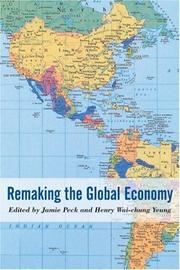| Listing 1 - 10 of 12 | << page >> |
Sort by
|

ISBN: 0415309891 1134390505 0203400461 1280053739 020335060X 041540858X 9780203400463 9780415309899 9786610053735 6610053731 9781134390502 9781280053733 9781134390458 9781134390496 9780415408585 1134390491 Year: 2004 Publisher: London New York Routledge
Abstract | Keywords | Export | Availability | Bookmark
 Loading...
Loading...Choose an application
- Reference Manager
- EndNote
- RefWorks (Direct export to RefWorks)
Chinese Capitalism in a Global Era examines the dynamic ways in which millions of ethinic Chinese in East and Southeast Asian economies organize their economic activities. It analyses how Chinese capitalism has changed under conditions of contemporary globalization and anticipates what the future holds for it. The book challenges the conventional notion of Chinese cpitalism as 'crony capitalism', based around kinship networks and untouched by globalization.
Capitalism --- Chinese --- Economic conditions. --- Ethnology
Book
ISBN: 1503632237 1503615294 1503632229 Year: 2022 Publisher: Stanford, California : Stanford University Press,
Abstract | Keywords | Export | Availability | Bookmark
 Loading...
Loading...Choose an application
- Reference Manager
- EndNote
- RefWorks (Direct export to RefWorks)
The global electronics industry is one of the most innovation-driven and technology-intensive sectors in the contemporary world economy. From semiconductors to end products, complex transnational production and value-generating activities have integrated diverse macro-regions and national economies worldwide into the "interconnected worlds" of global electronics. This book argues that the current era of interconnected worlds started in the early 1990s when electronics production moved from systems dominated by lead firms in the United States, Western Europe, and Japan towards increasingly globalized and cross-macro-regional electronics manufacturing centered in East Asia. By the 2010s, this co-evolution of production network complexity transformed global electronics, through which lead firms from South Korea, Taiwan, and China integrated East Asia into the interconnected worlds of electronics production across the globe. Drawing on literature on the electronics industry, new empirical material comprising custom datasets, and extensive personal interviews, this book examines through a "network" approach the co-evolution of globalized electronics production centered in East Asia across different national economies and sub-national regions. With comprehensive analysis up to 2021, Yeung analyzes the geographical configurations ("where"), organizational strategies ("how"), and causal drivers ("why") of global production networks, setting a definitive benchmark into the dynamic transformations in global electronics and other globalized industries. The book will serve as a crucial resource for academic and policy research, offering a conceptual, empirically driven grounding in the theory of these networks that has become highly influential across the social sciences.
Electronic industries --- Globalization --- Equipment and supplies. --- Economic aspects. --- East Asia. --- Electronics industry. --- Global production networks. --- Information and communications technology. --- International outsourcing. --- Mobile handsets. --- Organizational innovation. --- Personal computers. --- Semiconductors. --- Strategic partnership.
Book
ISBN: 9781501704277 Year: 2016 Publisher: Ithaca, NY
Abstract | Keywords | Export | Availability | Bookmark
 Loading...
Loading...Choose an application
- Reference Manager
- EndNote
- RefWorks (Direct export to RefWorks)
Article
Abstract | Keywords | Export | Availability | Bookmark
 Loading...
Loading...Choose an application
- Reference Manager
- EndNote
- RefWorks (Direct export to RefWorks)
Book
ISBN: 9781119845492 9781119845508 Year: 2024 Publisher: Hoboken, NJ : John Wiley & Sons,
Abstract | Keywords | Export | Availability | Bookmark
 Loading...
Loading...Choose an application
- Reference Manager
- EndNote
- RefWorks (Direct export to RefWorks)
"A thought-provoking resource detailing why causal theory is useful in geographical enquiry and how it can be developed through mechanism-based thinking. Includes a multitude of approaches and concepts in human geography today, covering important caveats, key considerations, and a synthetic approach Details contemporary geographical thought, covering theory in Marxism, poststructuralism and post-phenomenology/posthumanism, and feminism and postcolonialism Explores relationality and relational thought in contemporary human geography, plus moving towards a relational theory for the 2020s and beyond Discusses mechanism and process in causal explanation, covering causal theory and actors, neoliberalization, and the process-mechanism distinction of neoliberalism Essential reading for academics, geographers, and scholars seeking unique perspective on an important facet of the field"--
Human geography --- Géographie humaine. --- Philosophie. --- Méthodologie. --- Philosophy. --- Methodology.
Digital
ISBN: 9781501704277 Year: 2016 Publisher: Ithaca, N.Y. Cornell University Press
Abstract | Keywords | Export | Availability | Bookmark
 Loading...
Loading...Choose an application
- Reference Manager
- EndNote
- RefWorks (Direct export to RefWorks)

ISBN: 076194897X 0761948988 1446216764 9786610369171 1280369175 1412933145 9781412933148 9781446216767 9780761948971 9780761948971 9780761948988 Year: 2003 Publisher: London Sage
Abstract | Keywords | Export | Availability | Bookmark
 Loading...
Loading...Choose an application
- Reference Manager
- EndNote
- RefWorks (Direct export to RefWorks)
This text offers a state-of-the-art survey of geographical perspectives on the restructuring and reorganization of the global economy. With contributions from leading figures in the globalization debate, it explores the latest thinking and research across a range of interrelated issues.
Economic geography --- Economic geography. --- Globalization. --- International economic relations. --- Géographie économique --- Mondialisation --- Relations économiques internationales --- 911.3:33 --- #SBIB:33H071 --- #SBIB:043.IOS --- Economische geografie --- Economische internationale betrekkingen --- Globalization --- International economic relations --- Commerce --- Business & Economics --- International Commerce --- Geografie --- Wereldeconomie Globalisering. --- Géographie économique --- Relations économiques internationales --- Economic policy, Foreign --- Economic relations, Foreign --- Economics, International --- Foreign economic policy --- Foreign economic relations --- Interdependence of nations --- International economic policy --- International economics --- New international economic order --- Global cities --- Globalisation --- Internationalization --- Geography, Economic --- World economics --- Economic policy --- International relations --- Economic sanctions --- Anti-globalization movement --- Geography --- Commercial geography
Book
ISBN: 1501702556 1501702564 1501704265 1501704273 Year: 2016 Publisher: Cornell University Press
Abstract | Keywords | Export | Availability | Bookmark
 Loading...
Loading...Choose an application
- Reference Manager
- EndNote
- RefWorks (Direct export to RefWorks)
Book
ISBN: 0333716299 Year: 2000 Publisher: Basingstoke Macmillan
Abstract | Keywords | Export | Availability | Bookmark
 Loading...
Loading...Choose an application
- Reference Manager
- EndNote
- RefWorks (Direct export to RefWorks)
Book
ISBN: 0191773093 Year: 2015 Publisher: Oxford : Oxford University Press,
Abstract | Keywords | Export | Availability | Bookmark
 Loading...
Loading...Choose an application
- Reference Manager
- EndNote
- RefWorks (Direct export to RefWorks)
This volume ultimately aims to develop a theory of global production networks that explains economic development in the interconnected global economy. It provides robust answers to a fundamental question: how is development in different economies driven by their participation in value activities organised through global production networks? These answers can also offer new theoretical insights into why the organisation and coordination of global production networks varies significantly between different industries, sectors, and economies, and why those variations matter for economic development.
Globalization --- Production (Economic theory) --- Economic aspects.
| Listing 1 - 10 of 12 | << page >> |
Sort by
|

 Search
Search Feedback
Feedback About UniCat
About UniCat  Help
Help News
News